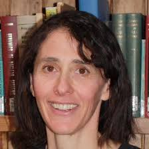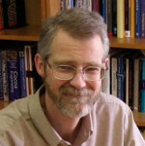
| Home | Details | Program | Speakers | Register |
 Complexity:
A Guided Tour
Complexity:
A Guided TourAs science probes the nature of life, society, and technology ever more closely, what it finds there is complexity. The sophisticated group behavior of social insects, the unexpected intricacies of the genome, the dynamics of population growth, and the self-organized structure of the World Wide Web---these are just a few examples of complex systems that still elude scientific understanding. Comprehending such systems seems to require a wholly new approach, one that re-maps long-standing disciplinary boundaries. In this lecture, I will present examples that illustrate how the interdisciplinary field of complex systems science is discovering common principles underlying different natural and technological systems.
Melanie Mitchell is Professor of Computer Science at Portland State University, and External Professor and Member of the Science Board at the Santa Fe Institute. She attended Brown University, where she majored in mathematics and did research in astronomy, and the University of Michigan, where she received a Ph.D. in computer science, Her dissertation, in collaboration with her advisor Douglas Hofstadter, was the development of Copycat, a computer program that makes analogies. She has held faculty or professional positions at the University of Michigan, the Santa Fe Institute, Los Alamos National Laboratory, the OGI School of Science and Engineering, and Portland State University. She is the author or editor of five books and numerous scholarly papers in the fields of artificial intelligence, cognitive science, and complex systems. Her most recent book, Complexity: A Guided Tour (Oxford, 2009), won the 2010 Phi Beta Kappa Science Book Award. It was also named by Amazon.com as one of the ten best science books of 2009, and was long listed for the Royal Society's 2010 book prize. Melanie directs the Santa Fe Institute's Complexity Explorer project, which offers online courses and other educational resources related to the field of complex systems.
 Autopoiesis and Enaction in the Game of Life
Autopoiesis and Enaction in the Game of Life When is a system alive? Humberto Maturana and Francisco Varela proposed the notion of autopoiesis (literally, "self-production") as the basis for a principled answer to this question. This notion has subsequently flowered into the so-called enactive approach that places biological autonomy at the foundation of understanding situated and embodied behavior and cognition. In this talk, I will describe an attempt to place these ideas on a sound theoretical footing bystudying them within a toy model universe, John Conway's Game of Life (GoL) cellular automaton. In particular, I will identify the primitive processes that can occur in GoL, show how these can be linked together into self-enabling and self-individuating networks, map the response of such entities to environmental perturbations, and investigate the paths of mutual perturbation that such GoL entities and their environments can undergo.
Randall Beer received a Ph.D. in Computer Science from Case Western Reserve University in 1989. He subsequently joined the faculty there,rising to the rank of Full Professor in the Depts. of Electrical & Computer Engineering, Biology, and Cognitive Science. He spent a sabbatical year at the Santa Fe Institute from 1995 to 1996 and served as an external faculty member from 1997 to 2003. In 2006, he moved to Indiana University, where he is currently a Provost Professor of Cognitive Science, Neuroscience, and Computer Science & Informatics. From 2009-2015, he directed an IGERT training program within the Cognitive Science Program that involved faculty and students from cognitive science, psychology, neuroscience, informatics, computer science, philosophy and physics. Broadly speaking, his research concerns how organisms operate as integrated wholes, with a particular focus on how behavior arises from the interaction between brains, bodies and environments.
 Intelligence Emerging
Intelligence Emerging
Keith Downing
Professor of Artificial Intelligence
Norwegian University of Science and Technology
Affiliate Scholar, Oberlin College Department of Neuroscience
This talk aims to add some depth to the popular (but often vague) claim that intelligence is an emergent phenomenon. Emergent systems – those in which global patterns arise solely from local interactions and are maintained by purely decentralized control – are popular topics in the scientific literature, for both experts and laymen. But whereas many of the classic examples of emergence involve one or a few well-understood local mechanisms that produce a very tangible global structure, intelligence is a very diffuse global phenomena supported by a myriad processes, some only weakly codified in the scientific literature. This talk will focus on neural networks (both natural and artificial) and how their adaptive abilities in three time frames – evolutionary, developmental and lifetime learning ‐ underlie the emergence of cognition. A NOVA model will help illustrate some of the interactions between these three levels, along with the importance of relatively primitive, but persistent, trial-and-error search in the emergence of neural structures.
Keith Downing is a professor of Artificial Intelligence (AI) at the Norwegian University of Science and Technology (NTNU) in Trondheim, Norway. He is also an Affiliate Scholar in the Neuroscience Department of Oberlin College. His main interests, experiences and publications are at the intersection of AI, Artificial Life, and Computational Neuroscience. These have culminated in his recent book, Intelligence Emerging (MIT Press, 2015).
 The
Application of Genetic Algorithms to Addressing Problems in
Evolutionary Ecology
The
Application of Genetic Algorithms to Addressing Problems in
Evolutionary Ecology
Wayne M. Getz
A. Starker Leopold Professor of Wildlife Ecology
University of California, Berkeley
Individual-based simulation models, embedded in a genetic algorithmic (GA) framework, can be use to study evolutionary processes in complex ecological systems. Here I will present a GA implementation on the Nova software platform. Nova seamlessly combines the dynamical systems modeling of growth and ecological processes with agent-based modeling of individuals that choose mates and reproduce at rates correlated with their ecological fitness. I will focus on consumer-resource systems that involve simulating the movement of individuals over landscapes, using an architecture that lays transparent the following four hierarchical simulation levels: 1) within-patch consumer resource dynamics; 2) within-generation movement and competition mitigation processes; 3) across-generation evolutionary processes; and 4) multiple runs to generate the statistics needed for comparative analyses. The focus of our analysis is on the question of how the biomass production efficiency and the diversity of guilds of foraging strategy types, exploiting resources over a patchy landscape, evolve under clonal versus random hermaphroditic sexual reproduction, as well as under mate choice consanguinity constraints. I will also discuss how our analysis provides new insights into the minimal requirements for sympatric speciation to occur for a guild of individuals exploiting a common resource.
Wayne Getz is A. Starker Leopold Professor of Wildlife Ecology at the University of California, Berkeley and an Extraordinary Professor in the Mathematical Sciences at the University of KwaZulu-Natal. He received a Ph.D. degree in Applied Mathematics from the University of the Witwatersrand, South Africa, and a D.Sc. in Zoology from the University of Cape Town, South Africa. Beyond his 250 plus research publications, he has coauthored a monograph on Population Harvesting and a textbook on Calculus for the Life Sciences.
 A Complex
Systems View of Infectious Disease Outbreaks
A Complex
Systems View of Infectious Disease Outbreaks
Samuel V. Scarpino
Assistant Professor, Mathematics, Statistics & Complex Systems
University of Vermont
Understanding infectious diseases requires us to piece together the numerous factors affecting pathogen transmission and discern how they interact to cause outbreaks. Factors like host behavior and population structure, pathogen evolution, and the effect of various interventions are just a few of the many interacting systems that influence how diseases spread through populations. In this talk, I will present three ways in which studying disease through a complex systems lens has improved both our scientific understanding of outbreaks and our ability to deploy effective interventions. First, I will discuss how a seemingly prudent behavior can accelerate disease transmission. Next, I will explore the influence of poverty on the scale of influenza and Ebola virus outbreaks. Finally, I will describe the role of social network clustering in the recent West African Ebola outbreak.
Samuel V. Scarpino is an Assistant Professor of Mathematics and Statistics and Complex Systems at the University of Vermont, where his research focuses on understanding disease as an emergent process and improving public health surveillance. His surveillance research is done in close association with state, national, and international public health agencies and has led to substantive changes in public health practices. Beyond disease, Sam's research has also focused on abroad range of topics, including animal movement and group dynamics; traffic routing; the effects of environmental toxins on behavior and neural biology; and models of multi-level data aggregation. In addition to basic research, he has worked for the past eight years developing and deploying decision support and data analytic tools for public health. Sam holds an undergraduate degree in biology from Indiana University Bloomington, and a Ph.D. in Integrative Biology from The University of Texas at Austin.
 rms@cs.oberlin.edu
Last modified: Thu Mar 3 12:59:30 EST 2016
rms@cs.oberlin.edu
Last modified: Thu Mar 3 12:59:30 EST 2016